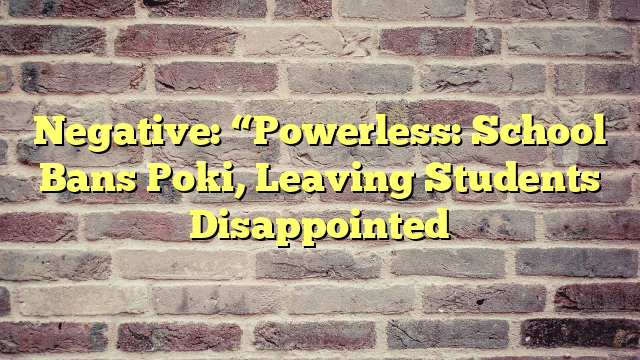Focus Keyword: School Bans Poki
Subheadings:
1. The Power of Poki: A Popular Online Game
2. A Controversial Ban: Why the School Decided to Prohibit Poki
3. Students React: Disappointment and Frustration
4. Impact on Student Life: Social and Educational Consequences
5. Alternatives: Is There a Solution to the Poki Ban?
6. Parental Concerns: Safety or Overreaction?
7. The Bigger Picture: The Debate on Banning Online Games in Schools
Poki, a popular online game, has recently been banned in a school, leaving students disappointed and frustrated. The ban has sparked a debate on the power of schools to control students’ access to online games and the impact it has on their social and educational well-being. In this article, we will delve into the reasons behind the ban, its consequences, and whether there is a solution to this issue.
The Power of Poki: A Popular Online Game
Poki, also known as Agar.io, is an addictive online game that has taken the internet by storm. The game involves controlling a cell and trying to become the largest one by eating smaller cells and avoiding being eaten by larger ones. With its simple yet engaging gameplay, Poki has gained a huge following among students, who often play it during their free time at school.
A Controversial Ban: Why the School Decided to Prohibit Poki
The decision to ban Poki in the school has sparked controversy among students and parents alike. The school administration states that the game is a distraction and disrupts the learning environment. They also argue that the game promotes violence and can be addictive, leading to a decrease in academic performance. However, many students and parents see the ban as an overreaction and an infringement on students’ freedom.
Students React: Disappointment and Frustration
The ban on Poki has left many students disappointed and frustrated. For some, the game was a way to unwind and destress during breaks, while for others, it was a way to bond with their friends. The sudden prohibition has disrupted their routine and left them feeling disconnected from their peers. In addition, students who were top players in the game feel as though their achievements have been erased.
Impact on Student Life: Social and Educational Consequences
The ban on Poki has not only affected students’ leisure time but also their social and educational well-being. With the game being banned, students no longer have a common topic to talk about or bond over, leading to a sense of isolation. Moreover, the game has also been used as a tool for group projects and team-building activities, and its absence has hindered students’ collaboration skills.
Alternatives: Is There a Solution to the Poki Ban?
One possible solution to the Poki ban is to find a balance between allowing students to play the game and ensuring it does not disrupt the learning environment. This can be achieved by setting specific times or locations for playing the game, such as during breaks or in designated areas. Additionally, the school can also introduce educational games that can be integrated into the curriculum to engage students in a productive way.
Parental Concerns: Safety or Overreaction?
Some parents support the ban on Poki, citing concerns about their children’s safety. They argue that online games can expose children to inappropriate content and online predators. However, others believe that it is the responsibility of parents to monitor their children’s online activities and teach them how to use the internet safely. Banning the game entirely may not be the most effective solution.
The Bigger Picture: The Debate on Banning Online Games in Schools
The ban on Poki in this school is not an isolated incident. Many schools around the world have also prohibited online games, citing similar reasons. However, there is a growing debate on whether banning online games in schools is an effective approach. Some argue that it hinders students’ creativity and problem-solving skills, while others believe that it is necessary to maintain discipline and focus.
In conclusion, the ban on Poki in this school has caused disappointment and frustration among students. While the school administration has valid concerns, it is essential to consider the impact on students’ social and educational well-being. Finding a balance between allowing students to play the game and maintaining a conducive learning environment may be the key to resolving this issue. Ultimately, the debate on banning online games in schools continues, and it is up to schools and parents to find the best solution for their students.

